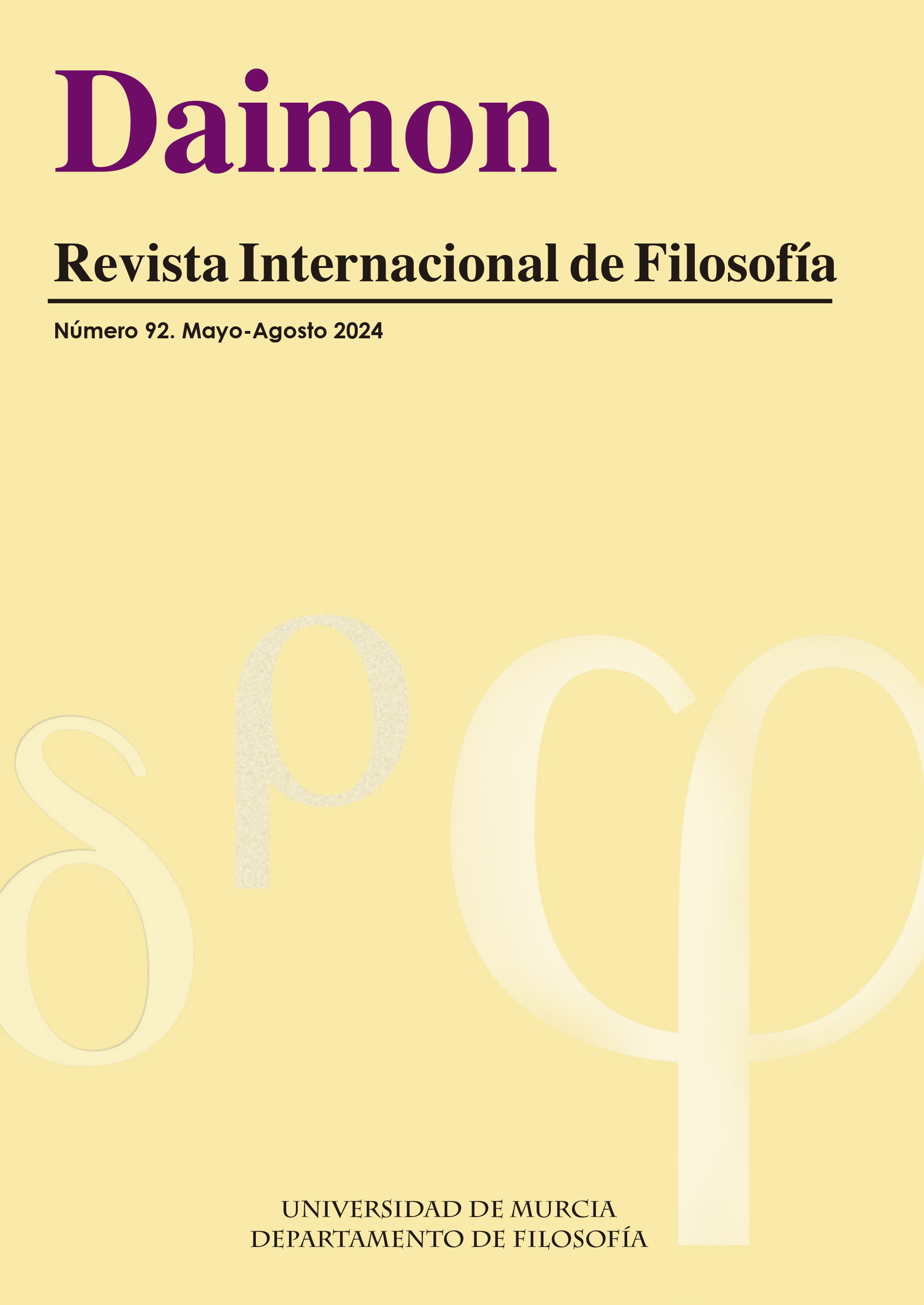Syllogism as a Combination in Alexander Of Aphrodisias
Abstract
In the ancient commentary on Aristotelian logic, the Greek term συζυγία (syzygía) refers to the combination of two propositions that have one or both terms in relation. The term turns out to be the genus from which the three deductive rules of Aristotelian logic are specified: conversion (if both terms are common, but change their order), opposition (if both terms are common, but do not change their position) and syllogism (if a single term is common). Such teaching is not explicit in Aristotle, but his main commentator Alexander of Aphrodisias along with other authors of his time and later already knew it. This work shows that Alexander introduces this term together with a dialectical model that identifies the syllogism with the proof that solves a problem, which in turn is defined as that which does not have a proof. This emphasis shifts the commentary's perspective toward the task of finding combinations of premises that solve a problem. The article suggests that this dialectical model derived from the notion of combination and comes from previous authors, since the use of the term is attested in Cicero and even Aristotle himself uses it in the Topics. The article suggests the importance of Theophrastus in the development of this term.
Downloads
-
Abstract516
-
PDF (Español (España))221
-
HTML (Español (España))43
References
BARNES, J. 1983. “Terms and sentences: Theophrastus on hypothetical syllogisms”. Dawes Hicks Lecture on Philosophy. The Proceedings of the British Academy, London. Vol. LXIX: Oxford University Press.
BARNES, J. 1991. Alexander of Aphrodisias on Aristotle Prior Analytics 1.1-7. Translation by J. Barnes; S. Bobzien; K. Flannery; and K. Ierodiakonou. Ancient Commentators on Aristotle. R. Sorabji (ed.). London: Duckworth.
BOCHEŃSKI, I.M. 1947. La logique de Théophraste. Fribourg en Suisse : Librarie de L’Université.
BOCHEŃSKI, I.M. 1951: Bochénski, I.M., Ancient Formal Logic, in Studies in Logic and the Foundations of Mathematics, Amsterdam 1951.
REMOVED 2017:
FORTENBAUGH, W. HUBY, P., SHARPLES, R.W. GUTAS, D. 1992 (ed.) Theophrastus of Eresus. Sources for his life, writings thought and influence. Leiden · New York ·Köln: E.J. Brill.
KIEFFER 1964: Kieffer, J.S., Galen's Institutio Logica. Translation with introduction and notes. Baltimore 1964.
LEE 1984: Lee, Tae-Soo, Die grieschische Tradition der aristotelischen Syllogistik in der Späntantike, eine Untersuchung über die Kommentare zu den Analytica Priora von Alexander Aphrodisiensis, Ammonius und Philoponus. Hypomnemata, 79, Göttingen, 1984.
LONDEY & JOHANSON 1987: Londey, D.G. & Johanson, C. The logic of Apuleius: including a complete Latin text and English. Leyden/New York: Brill.
LUMPE, A. 1982. Die Logik des Pseudo-Apuleius. Augsburg: Seitz.
MEISER, C. 1877-1880. Anicii Manlii Severini Boetii Commentarii in Librum Aristotelis PERI ERMHNEIAS. Prima et secunda editio. C. Meiser (Ed.), Leipzig 1877-1880: Teubner.
MORESCHINI, C. 2015. Apuleius and the Metamorphoses of Platonism:Turnhout.
MYNORS, R.A.B. 1937. Ed. Cassiodori Senatoris Institutiones. Oxford: Oxford University Press.
PRANTL, C. 1855. Geschichte der Logik im Abenlande. Band I. Leipzig: S. Hirzel.
RAMSEY, K.E. 2017. A commentary on the Peri Hermeneias ascribed to Apuleius of Madaura, PhD Thesis. Royal Holloway, Univ. London.
ROSE, V. 1867. “Über eine Angebliche Paraphrase des Themistius”. Hermes 2, pp. 191-213.
SMITH, R. 1989. Aristotle. Prior Analytics. Translated with introduction, notes, and commentary. Indianapolis/Cambridge: Hackett Publishing Company.
STUMP, E. 1988. Boethius’s In Ciceronis Topica. Translated, with notes and an introduction. Ithaca and London: Cornell University Press.
SULLIVAN, M. 1967. Apuleian Logic. Amsterdam: North Holland Publ.
THOMAS, P. 1908. Ed. Apulei Opera Quae Supersunt, vol iii, Apulei Platonici Madaurensis De Philosophia Libri, liber PERI ERMHNEIAS, pp. 176-194. Leipzig, 1908: Teubner.
THOMSEN THÖRNQVIST, C. 2008: Thomsen Thörnqvist, C. Anicii Manlii Seuerini Boethii De syllogismo categorico. A critical edition with introduction, translation, notes and indexes. Studia Graeca et Latina Gothoburgensia LXVIII, University of Gothenburg: Acta Universitatis Gothoburgensis.
TODD, R.B. 2003. Catalogum Translationum et Commentariorum. Mediaeval and Renaissance Latin Translation and Commentaries, vol. 8. V. Brown (ed.). Washington D.C.: The Catholic Univ. of America Press.
WALLIES, M. 1883. Ed. Alexandri in Aristotelis Analyticorum Priorum Librum I Commentarium, in Commentaria in Aristotelem Graeca 2.1, Berlin: Reimer.
WALLIES, M. 1884. Ed. Themistii quae fertur in Aristotelis Analyticorum Priorum Librum I Paraphrasis), Commentaria in Aristotelem Graeca 5.23, 4, Berlin: Reimer.
WALLIES, M. 1905. Ed. Ioannis Philoponi in Aristotelis Analytica Priora, in Commentaria in Aristotelem Graeca 13. 1-2, Berlin: Reimer.
WALLIES, M. 1899. Ed. Ammonii in Aristotelis Analyticorum Priorum Librum I Commentarium, M. Wallies (ed.), Commentaria in Aristotelem Graeca 4.6, Berlin: Reimer.
WALLIES, M. 1900. Ed. Themistii Analyticorum posteriorum paraphrasis. M. Wallies (ed.). Commentaria in Aristotelem Graeca 5.1, Berlin: Reimer.
Copyright (c) 2023 Daimon Revista Internacional de Filosofia

This work is licensed under a Creative Commons Attribution-NonCommercial-NoDerivatives 3.0 Unported License.
Las obras que se publican en esta revista están sujetas a los siguientes términos:
1. El Servicio de Publicaciones de la Universidad de Murcia (la editorial) conserva los derechos patrimoniales (copyright) de las obras publicadas, y favorece y permite la reutilización de las mismas bajo la licencia de uso indicada en el punto 2.
2. Las obras se publican en la edición electrónica de la revista bajo una licencia Creative Commons Reconocimiento-NoComercial-SinObraDerivada 3.0 España (texto legal). Se pueden copiar, usar, difundir, transmitir y exponer públicamente, siempre que: i) se cite la autoría y la fuente original de su publicación (revista, editorial y URL de la obra); ii) no se usen para fines comerciales; iii) si remezcla, transforma o crea a partir del material, no podrá distribuir el material modificado.
3. Condiciones de auto-archivo. Se permite y se anima a los autores a difundir electrónicamente las versiones pre-print (versión antes de ser evaluada) y/o post-print (versión evaluada y aceptada para su publicación) de sus obras antes de su publicación, ya que favorece su circulación y difusión más temprana y con ello un posible aumento en su citación y alcance entre la comunidad académica. Color RoMEO: verde.











